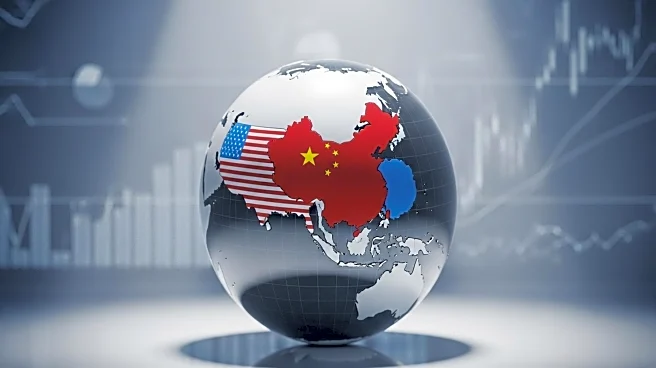What's Happening?
Asian stock markets experienced a downturn following President Trump's announcement of potential new tariffs on Chinese imports. The Nikkei futures index in Japan, although closed for a holiday, had previously dropped by approximately 5 percent before recovering some losses. Other Asian markets, including Taiwan and Hong Kong, saw declines of around 2 percent, while South Korea's Kospi index and Shanghai's composite index fell by about 1 percent. This market reaction comes after President Trump indicated a possible 100-percent tariff on Chinese products starting November 1, alongside export controls on critical software. The announcement also included the cancellation of a planned meeting with China's leader, Xi Jinping.
Why It's Important?
The potential imposition of new tariffs by the United States on Chinese imports could escalate trade tensions between the two countries, affecting global markets and economies. Such measures may lead to increased costs for U.S. businesses relying on Chinese goods, potentially impacting consumer prices and supply chains. The broader economic implications could include shifts in trade alliances and strategies, as countries navigate the uncertainties of U.S.-China relations. Investors and businesses worldwide are closely monitoring these developments, as they could influence market stability and economic growth.
What's Next?
If President Trump proceeds with the tariff increase, it could prompt retaliatory actions from China, further straining bilateral relations. Businesses may need to adjust their strategies to mitigate the impact of higher tariffs, potentially seeking alternative suppliers or markets. Political leaders and trade organizations might engage in negotiations to prevent further escalation and seek resolutions. The global economic community will likely watch for any diplomatic efforts or policy changes that could alter the current trajectory of U.S.-China trade relations.
Beyond the Headlines
The ongoing trade tensions highlight the complexities of international trade policies and their far-reaching effects on global economies. Ethical considerations regarding protectionism versus free trade may arise, as countries balance national interests with global cooperation. Long-term shifts in trade patterns could emerge, influencing economic power dynamics and the future of international trade agreements.











